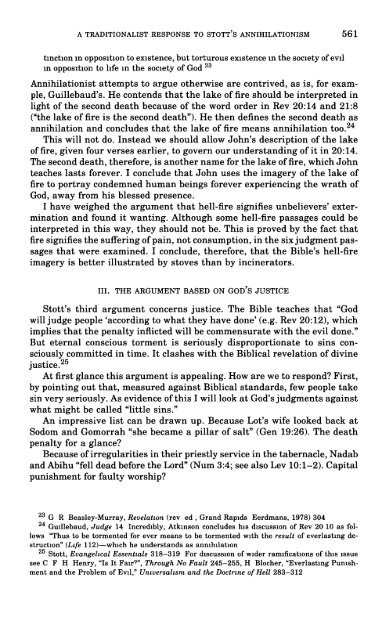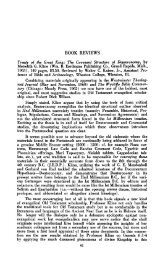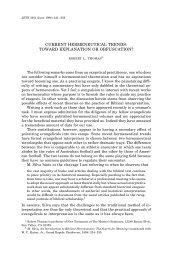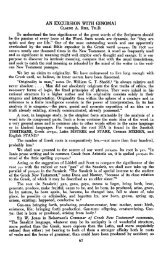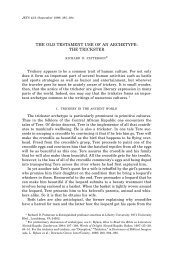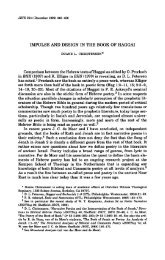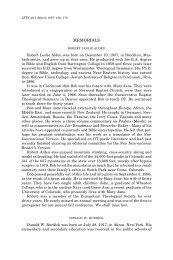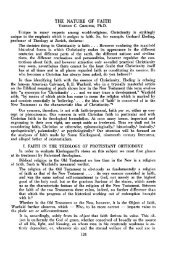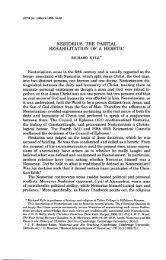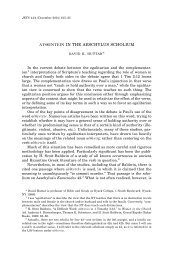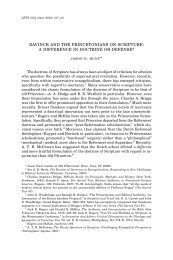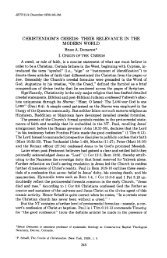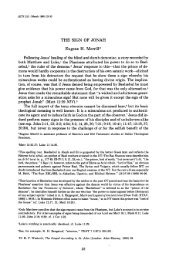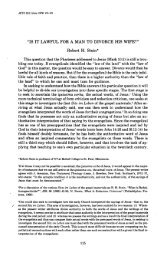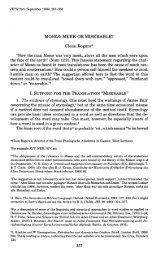a traditionalist response to john stott's arguments for annihilationism
a traditionalist response to john stott's arguments for annihilationism
a traditionalist response to john stott's arguments for annihilationism
Create successful ePaper yourself
Turn your PDF publications into a flip-book with our unique Google optimized e-Paper software.
A TRADITIONALIST RESPONSE TO STOTT'S ANNIHILATIONISM 5 6 1<br />
tinction in opposition <strong>to</strong> existence, but <strong>to</strong>rturous existence in the society of evil<br />
m opposition <strong>to</strong> life in the society of God 23<br />
Annihilationist attempts <strong>to</strong> argue otherwise are contrived, as is, <strong>for</strong> example,<br />
Guillebaud's. He contends that the lake of fire should be interpreted in<br />
light of the second death because of the word order in Rev 20:14 and 21:8<br />
("the lake of fire is the second death"). He then defines the second death as<br />
2 4<br />
annihilation and concludes that the lake of fire means annihilation <strong>to</strong>o.<br />
This will not do. Instead we should allow John's description of the lake<br />
of fire, given four verses earlier, <strong>to</strong> govern our understanding of it in 20:14.<br />
The second death, there<strong>for</strong>e, is another name <strong>for</strong> the lake of fire, which John<br />
teaches lasts <strong>for</strong>ever. I conclude that John uses the imagery of the lake of<br />
fire <strong>to</strong> portray condemned human beings <strong>for</strong>ever experiencing the wrath of<br />
God, away from his blessed presence.<br />
I have weighed the argument that hell-fire signifies unbelievers' extermination<br />
and found it wanting. Although some hell-fire passages could be<br />
interpreted in this way, they should not be. This is proved by the fact that<br />
fire signifies the suffering of pain, not consumption, in the six judgment passages<br />
that were examined. I conclude, there<strong>for</strong>e, that the Bible's hell-fire<br />
imagery is better illustrated by s<strong>to</strong>ves than by incinera<strong>to</strong>rs.<br />
III. THE ARGUMENT BASED ON GOD'S JUSTICE<br />
S<strong>to</strong>tt's third argument concerns justice. The Bible teaches that "God<br />
will judge people 'according <strong>to</strong> what they have done' (e.g. Rev 20:12), which<br />
implies that the penalty inflicted will be commensurate with the evil done."<br />
But eternal conscious <strong>to</strong>rment is seriously disproportionate <strong>to</strong> sins consciously<br />
committed in time. It clashes with the Biblical revelation of divine<br />
2 5<br />
justice.<br />
At first glance this argument is appealing. How are we <strong>to</strong> respond? First,<br />
by pointing out that, measured against Biblical standards, few people take<br />
sin very seriously. As evidence of this I will look at God's judgments against<br />
what might be called "little sins."<br />
An impressive list can be drawn up. Because Lot's wife looked back at<br />
Sodom and Gomorrah "she became a pillar of salt" (Gen 19:26). The death<br />
penalty <strong>for</strong> a glance?<br />
Because of irregularities in their priestly service in the tabernacle, Nadab<br />
and Abihu "fell dead be<strong>for</strong>e the Lord" (Num 3:4; see also Lev 10:1-2). Capital<br />
punishment <strong>for</strong> faulty worship?<br />
20 G R Beasley-Murray, Revelation (rev ed , Grand Rapids Eerdmans, 1978) 304<br />
Guillebaud, Judge 14 Incredibly, Atkinson concludes his discussion of Rev 20 10 as follows<br />
"Thus <strong>to</strong> be <strong>to</strong>rmented <strong>for</strong> ever means <strong>to</strong> be <strong>to</strong>rmented with the result of everlasting destruction"<br />
(Life 112)—which he understands as annihilation<br />
2 5 S<strong>to</strong>tt, Evangelical Essentials 318-319 For discussion of wider ramifications of this issue<br />
see C F H Henry, "Is It Fair?", Through No Fault 245-255, H Blocher, "Everlasting Punishment<br />
and the Problem of Evil," Universalism and the Doctrine of Hell 283-312


